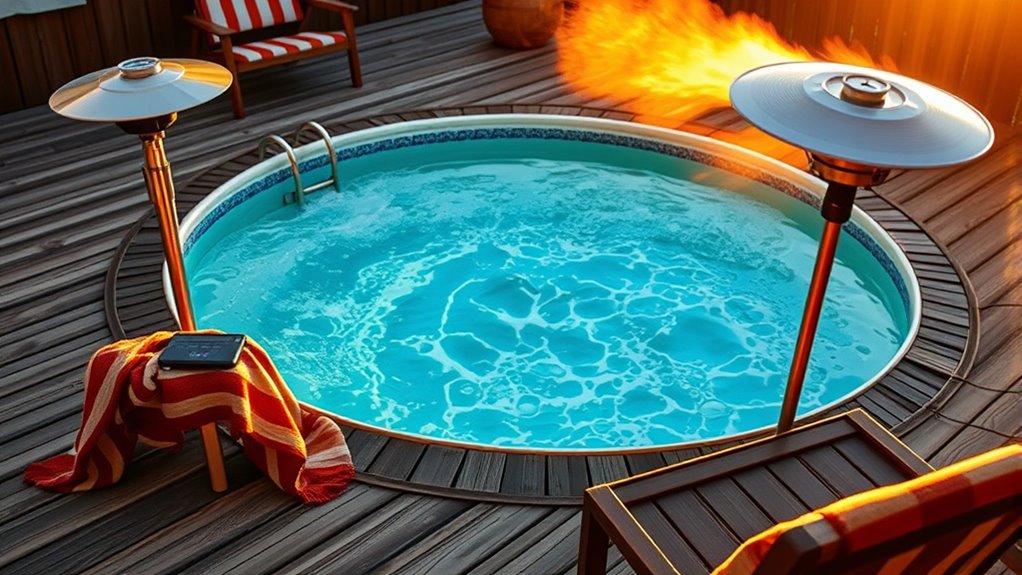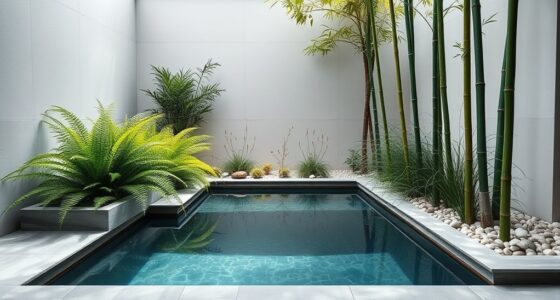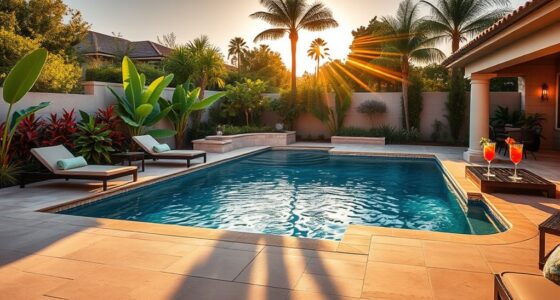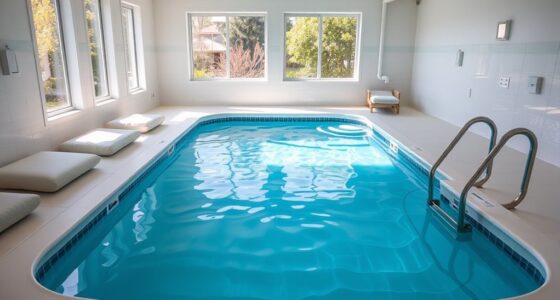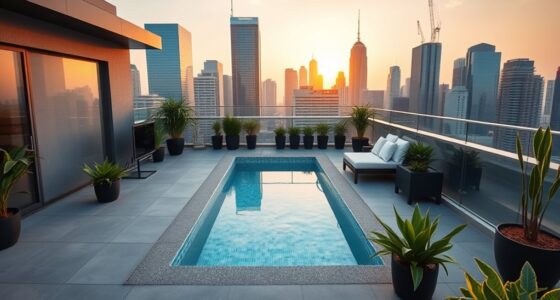To keep your small pool warm cost-effectively, consider installing solar pool heating panels, which harness free sunlight and reduce energy bills. Solar panels work best in sunny climates and can be complemented with a solar cover to retain heat. Alternatively, a high-efficiency heat pump can warm your pool year-round with lower running costs. Combining these methods can maximize warmth while minimizing expenses—if you want to explore more affordable options and tips, keep going.
Key Takeaways
- Install solar pool heating panels on your roof or nearby area to harness free sunlight and reduce energy costs.
- Use a solar cover to retain heat, minimize evaporation, and extend the swimming season cost-effectively.
- Consider a heat pump pool heater for efficient, reliable warmth, especially in less sunny climates.
- Combine solar panels with a heat pump system for maximum energy savings and consistent water temperature.
- Regular maintenance and proper insulation enhance system efficiency and prolong lifespan while keeping costs low.

Looking to enjoy your small pool year-round? Heating it efficiently is key to extending your swimming season without draining your wallet. Two of the most cost-effective options are solar panels and heat pumps. Both provide sustainable ways to keep your pool warm, but they work differently and suit different needs. Understanding how each functions can help you decide which method aligns best with your budget and climate.
Solar panels are a popular choice for pool heating because they harness the sun’s free energy. Installing solar panels on your roof or nearby can markedly reduce ongoing energy costs. During the day, the panels absorb sunlight and transfer the heat to your pool water via a series of pipes or collectors. This eco-friendly approach not only lowers your utility bills but also minimizes your carbon footprint. Keep in mind that solar panels depend on sunlight, so their efficiency drops on cloudy days or during winter months in colder climates. To maximize their effectiveness, you might need a backup heating system or consider installing a solar cover to help retain heat during the night. Additionally, properly maintaining your solar heating system can significantly improve its performance and longevity.
Solar panels harness free sunlight to efficiently heat your pool and lower energy bills.
Heat pumps are another smart, energy-efficient option for heating a small pool. They work by extracting heat from the outside air, even when temperatures dip, and then transfer that heat to your pool water. Unlike traditional electric or gas heaters, heat pumps consume less electricity, making them cheaper to operate over time. They’re especially effective in moderate climates and can quickly warm your pool to a comfortable temperature. While they do require an initial investment, their low operating costs mean you’ll save money in the long run. Plus, modern models are quiet, reliable, and easy to automate, giving you more control over your pool’s temperature.
Both solar panels and heat pumps are excellent for maintaining a warm pool in a cost-effective way. If you live in a sunny region and want to cut energy bills, solar panels are a great option. They work best during peak sunlight hours and can be complemented with a solar cover to keep heat trapped. On the other hand, if you’re in a region with less consistent sunshine or prefer a system that works regardless of weather, a heat pump offers reliable, year-round heating. Combining these methods can also be effective—using solar panels when the sun shines and a heat pump as a backup ensures your pool stays warm no matter the weather.
Choosing the right heating system depends on your climate, budget, and how often you want to swim. Both solar panels and heat pumps provide sustainable, cost-efficient ways to enjoy your small pool all year. With the right setup, you’ll be swimming comfortably without the high energy costs, making your backyard oasis even more inviting. Proper maintenance of your system can further enhance efficiency and lifespan, ensuring you get the most out of your investment.
Frequently Asked Questions
How Long Does It Take to Heat a Small Pool?
Heating a small pool depends on factors like pool size, insulation, and heater size. Usually, it takes about 8 to 12 hours to warm a small pool, but good pool insulation helps retain heat, reducing time and energy costs. Proper heater sizing ensures efficient heating without wasting energy. For quicker results, opt for a well-sized heater combined with quality insulation, and you’ll enjoy warm water sooner.
What Is the Maintenance Cost for Pool Heating Systems?
You’re curious about maintenance costs for pool heating systems. Generally, these costs depend on the system’s energy efficiency and usage. Regular upkeep, like checking filters and inspecting components, keeps your system running smoothly and prevents costly repairs. Energy-efficient systems tend to have lower maintenance costs over time. Budget for annual inspections and minor repairs, and you’ll keep your pool warm without breaking the bank.
Can Solar Covers Save Me Money on Heating?
Yes, solar covers can save you money on heating your pool. They boost solar efficiency by trapping heat and reducing heat loss, which means you’ll use less energy. Look for covers with high cover durability to guarantee they last through seasons. By investing in a quality solar cover, you’ll lower your energy bills and extend your swimming season, making it a smart, cost-effective choice for staying warm.
What Are the Safety Precautions for Pool Heaters?
When considering pool safety, always follow manufacturer instructions for heater installation to prevent electrical hazards. Keep the heater away from flammable materials and ensure proper grounding. Regularly inspect the unit for leaks or damage, and never leave the heater unattended while in use. Educate everyone about pool safety rules, especially around the heater, to avoid accidents. Proper installation and vigilant maintenance are key to guaranteeing safe, worry-free swimming.
How Do External Weather Conditions Affect Heating Efficiency?
You might wonder if weather impact affects your pool’s heating efficiency. In truth, external weather conditions play a significant role, especially temperature fluctuations. Cold air and wind can lower water temperature faster, making your heater work harder. Conversely, warmer weather helps maintain heat more easily. To improve efficiency, consider using a pool cover, which minimizes heat loss during chilly weather, ensuring you stay warm without overloading your heater.
Conclusion
Heating your small pool doesn’t have to drain your wallet. By exploring cost-effective methods, you can enjoy warm waters without overspending. Remember, sometimes the simplest solutions, like solar covers or efficient heaters, prove most effective—showing that sustainable choices often lead to the best results. Don’t underestimate small steps; they can make a big difference in keeping your pool warm and your costs low. Ultimately, smart, mindful decisions help you swim comfortably without breaking the bank.
